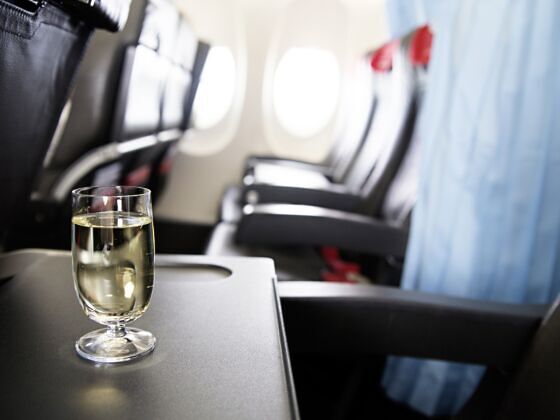If you’ve been on a flight, had a couple of drinks, and felt a little more buzzed than usual, it’s probably not just the excitement of your upcoming trip that is causing feelings of intoxication. Many people report feeling the effects of alcohol more intensely when consuming it during air travel. While your actual blood alcohol concentration remains the same as it would on land, the environment of an airplane cabin contributes to a heightened feeling of being drunk. Matador spoke with medical professionals to find out why this occurs and if it’s something we should be concerned about.


Flight attendants undergo comprehensive training in serving alcohol during flights and adhere to strict regulations so the crew can identify if a passenger is consuming excessively and may potentially pose a risk to themselves or others. You’ll also note that you’re offered a glass of water with every alcoholic drink served. This is due to the dehydrating environment, but more on that in a moment.
The main reason you may feel more intoxicated is that commercial airplanes maintain a cabin pressure equivalent to an altitude of approximately 6,000 — 8,000 feet. This lower pressure leads to decreased oxygenation in your blood, a condition known as hypobaric hypoxia. The atmospheric pressure is similar to that in Denver, says Dr Heather L Hinshelwood of The Fraum Center of Restorative Health in Hilton Head Island, South Carolina. What’s worse, Dr. Hinshelwood says that ethanol (the chemical name for alcohol) also prohibits oxygen from being absorbed into your bloodstream. This “double whammy,” as Hinshelwood calls it, leaves people feeling more buzzed than they would at sea level as your body will find it hard to process the chemicals.
Airplane cabins also have a very dry environment due to the air circulation systems. If you’ve ever taken a long-haul flight, you’ll know how dry and irritated your skin, lips and eyes can feel when you disembark. Dehydration also further intensifies the effect of alcohol, which can lead to symptoms such as fatigue and impaired cognitive function. It’s suggested passengers drink at least one to two bottles of water on mid to long flights.
So, should we be drinking at all in the air? Dr. Brynna Connor, Healthcare Ambassador at North West Pharmacy in Texas, says if you have any pre-existing conditions, such as cardiac or pulmonary conditions, you should not consume any alcohol before or during a flight. But if you are in good health, drinking in-flight should be in moderation. She also suggests eating a decent meal beforehand so the alcohol absorption will be slower.
If you have concerns about being in an environment like an aircraft where alcohol is accessible, Dr. Olalekan Otulana, substance misuse and addiction physician at London’s Cassiobury Court recommends taking triggers such as this while on vacation seriously. “Continue utilizing relapse prevention techniques,” he urges. He suggests testing out some mocktails and ensuring you have support from loved ones if you travel together.